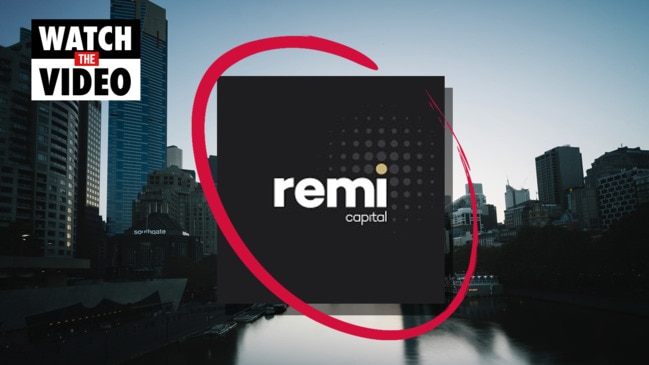Founder of collapsed company Remi Capital appears to set up new business called Zash Ventures
A Melbourne company founder appears to have set up a new company after his former investment firm went bust, with the same way of attracting investors.

Companies
Don't miss out on the headlines from Companies. Followed categories will be added to My News.
EXCLUSIVE
An Australian investment firm called Remi Capital that collapsed owing $124 million may have been insolvent since its launch in 2018 and had no income generating assets, according to a report to creditors, despite promising “mum and dad” investors big returns.
Now it appears that Remi’s founder and former director Peter Terrill may have set up a new business, called Zash Ventures, with the same methods of attracting investors as was used with Remi Capital, said insolvency expert Chris Baskerville.
Remi Capital used client lists from a network of accountants to promote its investment seminars, with some investors describing the pitches as lavish, with champagne and slick presentations.
But Remi Capital was placed into voluntary administration on May 25, with Mr Baskerville from specialist insolvency firm Jirsch Sutherland appointed as administrator.
Minutes from the creditor’s meeting filed with the Australian Securities and Investments Commission by Jirsch Sutherland noted “that there were no funds in the companies’ bank accounts on appointment”.
Preliminary investigations from the administrator revealed that the company’s debts had jumped from an estimated $70 million to $124 million.
Mr Baskerville said his team had been “burning the midnight oil” to deliver answers to Remi Capital’s 312 investors, who are owed at least $61.2 million, according to the creditors report filed with ASIC.
But the team at Jirsch Sutherland are also investigating Remi’s founder Mr Terrill, who was a director at the company between 2018 and March 2021.

Mr Terrill founded the company, which was formerly known as C2 Capital, in 2018 but Mr Baskerville told news.com.au he was “kicked out of” Remi Capital “by an exit deed” at the start of March 2021.
Mr Baskerville said the change in directors resulted from complaints by numerous employees, according to the creditor’s meeting’s minutes.
“It appeared as though there would be a mass staff ‘walkout’, if Mark Prestige did not replace Peter Terrill from the companies,” he said.
“A review of Peter Terrill’s exit deed identified that he was liable to the group in the amount of approximately $1 million, which will form part of the administrators’ investigations.”
Now, he has been described as a “person of interest” to creditors by Mr Baskerville as part of their investigation.
The administrator’s report to creditor’s filed with ASIC on Tuesday also confirmed that Mr Terrill is currently the director of a company called Zash Ventures.
“We think he has set up a new organisation called Zash Ventures and we think he is the guy behind it, obviously this is a suspicion and we will see if we can find evidence of it,” Mr Baskerville told news.com.au.
“But why we have suspicion is we think the company behind it could have been created by him and we believe some of the former staff of Remi have now made their way over to Zash.
“And it seems to be the same modus operandi, which is we are going to make friends with big accounting networks, encourage accountants to promote products to their clients, do investor meetings and pool a whole heap of investors into the room and do a presentation and entice investors that way.
“There is no trace of Peter Terrill on the Zash website.”
News.com.au has obtained documents from Zash Ventures that state that Mr Terrill is the managing partner and director, while he is also featured on the company’s social media pages, including a video spruiking the company and another showing its first in person event.


Zash was founded in March 2021 in Melbourne and had already raised $875,000 last year, according to a 60-page document produced by the company.
“Successfully held four intro events at Zash’s offices over November and December with over 100 attendees and many enlistment conversions of investors and stakeholders to support our growth,” the document states.
The terms of investments in Zash Venture sent to clients and seen by news.com.au showed a $50,000 investment would give them an 8.25 per cent return after 18 months, with the document signed by Mr Terrill.
News.com.au has reached out to Mr Terrill for comment but he did not respond.

Another document shows Zash is proposing to raise between $13.2 and $13.5 million in “global growth capital” this year and have a pool of “committed capital” in excess of $30 million.
Zash Ventures’ slick pitch to investors, via an information memorandum, states its vision is to “maximise investor wealth and entrepreneur success” by funding early stage ventures.
It said it would focus on four key areas – wealth tech in the funds management space, fintech’s that are disrupting the banking markets, smart cities “based on our experience in property” and globally focused small to medium enterprises.
“Just as McDonalds revolutionised fast food and rapid global business replication through a proven standardised methodology, Zash is dedicated to achieving similar fast growth in what it does,” the document states.

It set out ambitions to grow Zash Venture’s team from 93 in 2022 to 225 next year and 435 by 2024 across Australia, Asia, North America, the UK and Europe.
News.com.au has reached out to Zash Ventures for a comment but there was no response.
But Mr Terrill isn’t the only person that Jirsch Sutherland are investigating as part of the Remi Capital liquidation.
“The investigation includes all former officers of the entire group and we are interested in any party that held a senior position as they may have been able to influence some of the decision making,” he said.
“According to the committee of creditors some of the known parties to this entity have started to disappear off LinkedIn and social media – I find that very interesting. It sounds like some people are going to go to ground.”

Mum and dads impacted by Remi’s collapse
The report into Remi’s Capital’s collapse from Jirsch Sutherland showed that investors are currently owed $61.2 million.
“We think the bulk of investors are mum and dads and (people with) self managed super funds and the minimum investment had to be $50,000,” Mr Baskerville told news.com.au.
“I think every one of those investors had to sign up to say that they were a sophisticated investor, so to get sophisticated investor status the regulations say you have to have a net income around round $250,000 or net assets of over $2 million.
“We do believe that there are a handful of investors that put in potentially around $1 million and $5 million, but that’s not the majority.
“We think that’s a reflection of a small minority of (investors) but it looks like high net wealth investors have put their money into the scheme.”

One of the 312 investors impacted was a Melbourne dad of two, who had been left “shocked” and “heartbroken” after the Remi Capital collapse left $300,000 owed to his family.
He said payments stopped in September last year, even though the couple begged for the return of their money and offered to waive any interest payments owed.
Directors could face personal liability claims
Remi Capital’s parent company was put into liquidation by court order on June 9, but there are 11 companies within the group.
“Those 11 are running as voluntary administration and there will be a meeting of creditors on 29 June to decide the fate of those other 11 companies,” Mr Baskerville said.
Mark Prestige was the managing director of Remi Capital at the time of its collapse and was the sole director from March 2021.
“I have since held the position of sole director of Remi group for 15 months in an attempt to turnaround the group of companies,” he said in a statement supplied to the creditor’s meeting.
In a statement at the administrator’s first meeting, he expressed his “deepest regret as to how Remi” and investors came to be at the creditor’s meeting.
He said after taking over from Mr Terrill he had succeeded in significantly reducing cash-burn, brought tax and financial reporting obligations up to date, reduced staff from 54 to 17 and had a planned exit from projects that were not aligned with the capabilities of Remi.
Mr Prestige said a new strategy had been developed with a focus on regional acquisitions that were more in line with the group’s capabilities and he had secured funding for the property projects in Rockbank and Tarneit through a preferred funder.
“I believe Remi was heading in the right direction,” he said.
Mr Baskerville added he had been cooperative with providing accounting and other records to investigators.

However, Mr Baskerville flagged that both directors could be sued for insolvent trading.
“The way insolvent trading works is if its proved that a company is insolvent at a particular point of time and you are director at that point of time and then you go on and incur more debt that cannot be repaid than that debt then becomes a personal liability of the director at the time,” he told news.com.au.
Mr Baskerville’s view that the companies may have been trading insolvent was reflected in the report to creditors.
It revealed that there was an estimated total insolvent trading claim of $123 million, although news.com.au is not suggesting that either director could be sued for that amount alone.
It expressed a preliminary position that the companies had been trading while insolvent, potentially since inception and remained insolvent at all times up to the appointment of administrators.
The report also noted that the current and former directors had not been given an opportunity to present a defence to any insolvent trading claim.
Where the money went
The independent investment company had promised access to “responsibly and ethically managed investments” and included a range of boutique property developments, its website showed before it was shut down following its collapse.
Despite this, Mr Baskerville said preliminary investigations showed only 20 to 30 per cent of investor’s funds had been used to buy property, with 69 cents of each dollar invested appearing to go into operations expenses and another 11 cents to commissions and risk fees.

Documents provided to investors by Remi Capital showed they were offered returns worth 8 per cent a year, paid quarterly, and a further 5 per cent at the end of 12 months when investors could obtain their full investment back.
But the company lost money on the land it sold, according to Mr Baskerville, and did not complete one property project.
Its preliminary investigations also showed that even when first established the company had $3 million in equity but was $60 million in debt, the administrators found.
The company raised money through short term 12 month loans from investors, which was a “real mismatch” in cash flow for a company involved with property developments that could take years, Mr Baskerville added.
He said his firm had been required to do “quick and furious forensic investigations” into where the $124 million had gone and it was still “too early” to say whether investors would ever see their money again.
Minutes from the meeting show that a property owned by the company in Tarneit would see a surplus of $2 million if it was sold but approximately $10 million was owed to parties holding securities over it.
Another property in Sunshine North in Victoria was contracted to sell, the minutes from the meeting showed.
“The contract price was $10.8 million. Based on currently available information, there would be no surplus funds for unsecured creditors if the property were to sell at this price,” the administrator noted.

It also uncovered that $1 million was owed to employees, $6 million to the Australian Taxation Office and $22 million in secured debts but there were no audited financial statements.
News.com.au does not suggest the claims made by the administrators as part of the preliminary investigations into Remi Capital have been proven.
The Australian Investment and Security Commission has met with Mr Baskerville for a high level briefing.
“The administrators are in communications with ASIC regarding funding for investigations,
should the companies be placed into liquidation,” the report said.
“The administrators are also considering litigation funding from litigation funding specialists.”
sarah.sharples@news.com.au
Originally published as Founder of collapsed company Remi Capital appears to set up new business called Zash Ventures









